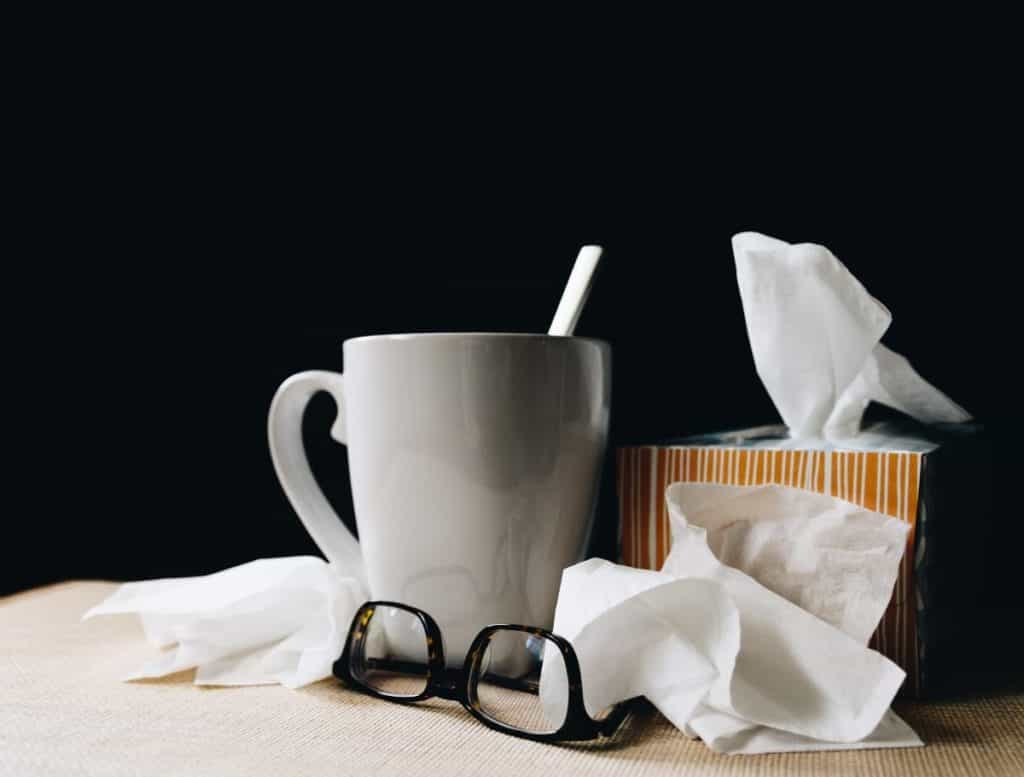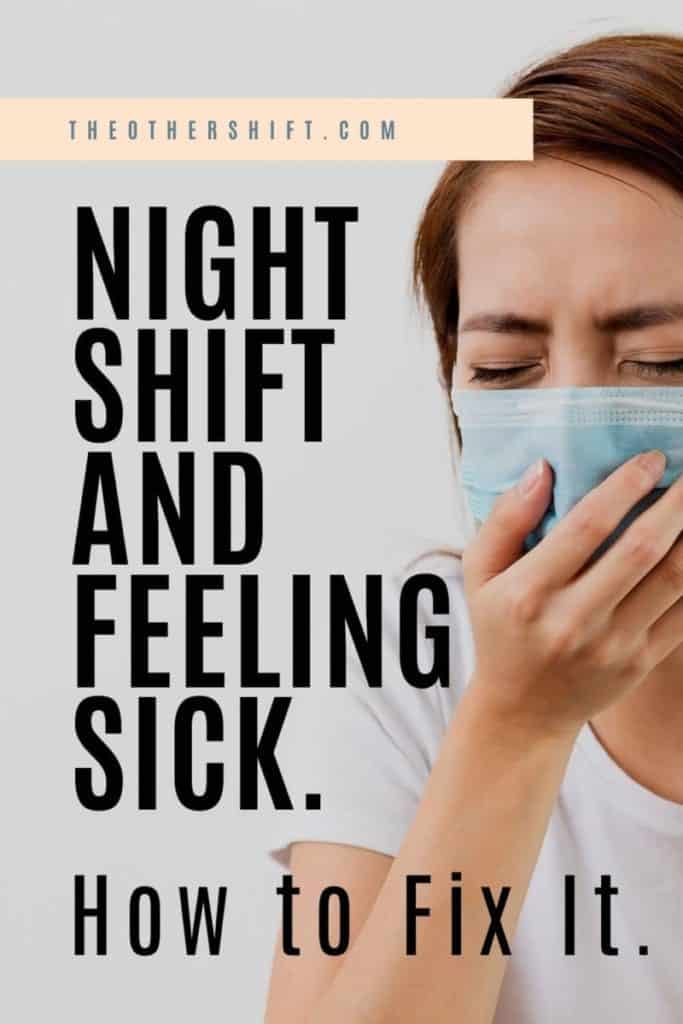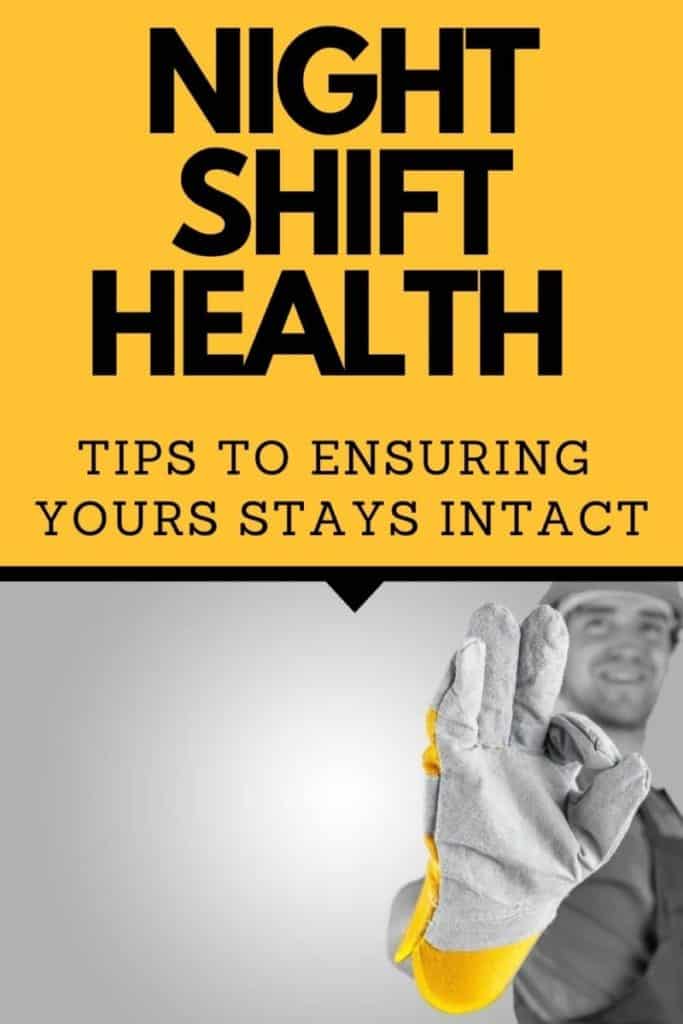Is working night shift making you feel sick? Maybe you don’t call it “a sickness” and more just a blurry, trace-type feeling. You might feel unmotivated, restless and seem to be battling persistent stomach bloating and pains and you have no idea why. All you do know is, you’d like it gone quick smart.
Feeling sick while on night shift is mainly due to working against our biological body clocks. However, the symptoms of feeling sick such as bloating, sadness, hangover or hazy can be improved through sleep, a healthy balanced diet, regular exercise, positive social interactions and mindset.
When working night shift, do you feel like you’re stuck in some kind of trance? Blankly staring or even interacting with people you have no recall of doing so. Most of us cannot refuse our night shift jobs, so let’s see what is in our control to avoid getting sick on the job.
Night Shift and Getting Sick
I have been an ER nurse for the past 10 years. I have constantly moved from day shift to night shift and back to day shift throughout this time. It’s safe to say I have a love / hate relationship with working 3rd shift.
I know as well as you, that the idea of getting sick as night shift worker cannot be understated. Our circadian rhythm, better known as our body clocks are biologically programmed to work a particular way. That is, to sleep during the night and be awake and active during the day whilst the sun is shining.
The fact we, as night shift workers, are turning this pre-programmed arrangement on it’s head means, according to a brilliant shift work related book titled, “Too Tired to Cook” by a seasoned shift worker Audry Starky,
“night shift workers are biologically stressed.”
We are therefore prone to problems the average 9-5 worker simply doesn’t experience if they are able to sleep 7-9 hours per night. (source )
)
Eating whilst the moon is shining, instead of the sun, can cause problems with our gut health, missing out on precious vitamin D rays can lead to fatigue, weak bones and pain (source ) and relying on coffee and foods high in sugar for energy can lead to dehydration, headaches, low mood, weight gain and importantly sleep deprivation.
) and relying on coffee and foods high in sugar for energy can lead to dehydration, headaches, low mood, weight gain and importantly sleep deprivation.
Whilst night shift doesn’t sound ideal, there are some tweaks we can make in our night shift working lives to lower this stress and help our bodies find a nice relationship with our biological clocks. Read on as we explore the common night shift sickness complaints, along with useful solutions.

Feeling Hungover When Working Night Shift
“Feeling hungover”
“In a trace”
“Feeling blaaaaaa”
Sound familiar? Due to the disruption in our body clocks, night shift workers like you and I often feel somewhat disconnected. And sleep, or a lack of it, seems to be the biggest culprit.
Though we are sleeping during the day our bodies still require 7-9 hours of sleep. If we don’t get enough it can lead to all sorts of issues we cover in detail here in a post titled, Is Night Shift Bad for You? 11 Truths Uncovered
Tips to feeling more energized and less “hazy”
- Limit switching from nights to days too often, if it can be helped. I totally understand some rosters and workplaces don’t have schedule flexibility but if you can complete a block of nights and days it’s much better than single nights and single days back to back.
- Try a range of sleep aids. Have you purchased your own blackout blinds and eye mask to create a “cave” like environment in your bedroom? Have you tried aromatherapy to induce sleep? Have you investigated what blue light blocking glasses are and how they might be effective in helping you fall asleep faster? Here are our favorite sleep aids you need to try. Now.

Related post: Shift Work Bedroom Ideas: Create the Ultimate Sleeping Oasis
- Eat a small breakfast after work and before getting into bed (while avoiding the caffeine). This will limit the chance of waking at 1pm with hunger pains. Choosing foods high in melatonin will also help naturally induce sleep. Here are some high in Melatonin foods
 you could try.
you could try.
- When moving onto night shift, do so gradually. In the 2-3 days before night shift go to bed later and later, ensuring you also sleep in. Aim for 7-9 hours while altering your routine. This techniques helps some 3rd shift workers withstand a harsh switch to night shift.
- Remain on the same schedule during days off. Though this won’t work for some, particularly for those with children, it can be effective in limiting your body clock adjustments. I found going to bed at 2am and waking at around 9-11am gave me the best of both worlds. Find out more about what to do on days off here.
- Try magnesium. According to WebMD
 , “Magnesium is a mineral that’s crucial to the body’s function. Magnesium helps keep blood pressure normal, bones strong, and the heart rhythm steady.” Some night shift workers also report it helps them with restless legs and sleep, particularly during times of stress. Find out more about the recommended night shift vitamins here.
, “Magnesium is a mineral that’s crucial to the body’s function. Magnesium helps keep blood pressure normal, bones strong, and the heart rhythm steady.” Some night shift workers also report it helps them with restless legs and sleep, particularly during times of stress. Find out more about the recommended night shift vitamins here.
- Smart use of caffeine. Caffeine is one of the most loved beverages by night shift workers but it can be to our detriment. To feel less “jittery” try having some caffeine at the beginning of your shift then switching to something else, such as the beverages we’ve got listed here, 5-6 hours before bed.
- Be aware of the light. Keeping the light on during the shift and also getting exposure after you’ve slept is great in realigning your body clock. However, exposure to light after your shift and when you’re trying to sleep is hugely detrimental. Get some blackout blinds (as I mentioned earlier), seriously consider blue light blocking glasses and get yourself an eye mask. You can not block out too much light.
As I was scrolling through Reddit recently, a fellow night shift worker stated that,
“light is the enemy”
and I couldn’t agree more.

Night Shift Stomach Aches
For years and years I complained about bloating and pain in my belly particularly after coming back to ER when finishing my break. I could never work out why I always felt so bad. Everyone else seemed to complain too, or at least empathized with me so I never really did much about it.
But besides the pain, I also felt tired and lethargic which again I assumed was just part of the night shift deal. But it seems it doesn’t have to be.
After reflecting and researching, our issues seem to stem from a few areas. Firstly, our hormones influencing when and what we eat and secondly our body clocks and its impact on our digestive system.
Our appetite hormones leptin and ghrelin are partially to blame and I found it important to understand them in order to make a change to my night shift working lifestyle.
Leptin, made by the fat cells, decrease your appetite making you feel full.
Leptin tells the brain that there’s enough fat in storage and no more is needed, which helps prevent overeating. (source ) In overweight individuals, this “full” message becomes weakened leading to overeating.
) In overweight individuals, this “full” message becomes weakened leading to overeating.
Ghrelin, on the other hand, increases your appetite playing a vital role in body weight.
When the body is sleep-deprived, the level of ghrelin spikes, while the level of leptin falls, leading to an increase in hunger.
Sleep Foundation
It seems to be a vicious cycle. If we don’t get enough sleep our hormones are telling us mixed messages to overeat which leads to nausea and feeling sick.
The other issue here is that our digestive system goes into a hibernation type mode overnight when it’s dark. The digestive system is directly linked to the light and dark messages it receives. Researches often say our digestive system is like our “second brain” (source ) due to its ability to operate independently of the brain and spinal cord, the central nervous system (CNS).
) due to its ability to operate independently of the brain and spinal cord, the central nervous system (CNS).
When we eat during this “hibernation time” food will take longer to digest leading to feelings of bloating and likely nausea. It can also lead to chronic gut issues too. According to the American Scientist , “Disruption of sleep-wake cycles damages the intestinal wall and promotes inflammatory disease.”
, “Disruption of sleep-wake cycles damages the intestinal wall and promotes inflammatory disease.”
A condition called “gut leakiness” is often a complaint of night shift workers which is a syndrome where toxins can pass through a weakened intestinal wall into the circulatory system, causing systemic inflammation. (source )
)
Related Post: When Should I Eat on Night Shift?
Solutions to Night Shift Stomach Aches
Though it may be impossible to fully avoid stomach aches on 3rd shift we can certainly help the situation but focusing not only on what we are putting out or mouths but when are doing so.
Here are some quick tips to avoid stomach aches, pain and bloating on 3rd shift:
- Eat as little as possible, whilst still feeling satisfied, energetic and productive overnight. Even consider intermittent fasting. Read about how it works and what to do here.

- If you’re hungry, consume high in protein snacks like almonds, hummus with celery, carrot and pepper sticks and even homemade energy balls. Here are 10 more
 healthy night shift snack ideas.
healthy night shift snack ideas.
- Keep a food diary to better understand which foods cause pain and discomfort. I call these my “trigger” foods.
- Have your largest meal of the day whilst the sun is shining (and not at 3am)
- Avoid foods high in gluten (pizza/pasta) and dairy (cows milk, cheese, yogurt) even if you are not dairy or gluten intolerant as it may help with digestion.
- Drink more water. You’ve heard this before but water is never a bad choice.
Related post: What Causes Night Shift Nausea and How to Finally Beat It

Headaches and Dizziness
Headaches and dizziness on night shift are all to common. Is it a lack of sleep? Increased stress? Dehydration? Poor lighting? Do you need reading glasses?
I’m not a doctor and I’m not here to diagnose you so please seek medical advice if something doesn’t feel right, but there could strategies you could try to relieve the pain. And no, I’m not simply talking about taking ibuprofen.
Solutions to Relieve Headaches on Night Shift
- Avoid dehydration. According to Medical News Today
 , “When the body is dehydrated, the brain can temporarily contract or shrink from fluid loss. This mechanism causes the brain to pull away from the skull, causing pain and resulting in a dehydration headache.” So, drink up.
, “When the body is dehydrated, the brain can temporarily contract or shrink from fluid loss. This mechanism causes the brain to pull away from the skull, causing pain and resulting in a dehydration headache.” So, drink up.
- We need to drink about eight 8-ounce glasses, which equals about 2 liters, or half a gallon (source
 ). I find drinking iced cold water throughout the night is not only hydrating but also energizing.
). I find drinking iced cold water throughout the night is not only hydrating but also energizing.
- Limit the high in sugar foods (source
 )
)
- Spend time every day in the sun getting your dose of Vitamin D. (source
 ) I find going for a walk or taking the dog to the park
) I find going for a walk or taking the dog to the park in the mid-late after waking is a great time for sun exposure.
in the mid-late after waking is a great time for sun exposure.
- For the ladies – Tie your hair in a looser bun/poly tail. For the gents – loosen your hat/headband.
- Have your eyes checked if you’re finding it increasingly more difficult to see and focus particularly at night.
- Keep the light on in your direct working area. This will not only assist with eye stain, it also keeps your sleep hormones awake. Read more about our sleep hormone melatonin here and why it’s so important for night shift workers to understand.
- Consider what is stressing you out. Are they within your control? Do you have coping mechanisms in place? Stress can be a big factor in getting headaches and migraines. (source
 )
)

Common Cold on Night Shift
“I’m coming down with something” is a common phase in the night shift community. There is generally always one or two people with a runny nose or a sore throat battling the night shift hours.
Again is this due to a lack of sleep? Poor diet? No sunlight exposure?
Though it can be a wide combination of things, there are some simple strategies we can try.
- Boost your immunity and clear your mind with SuperGreen TONIK
 green juice. I know that sounded cheesy but I love this stuff. I drink it every morning and it makes me feel alive regardless of what shift I am on. We did a detailed review here which included a 10% discount code if you dare to try something new.
green juice. I know that sounded cheesy but I love this stuff. I drink it every morning and it makes me feel alive regardless of what shift I am on. We did a detailed review here which included a 10% discount code if you dare to try something new.
- Drink.more.water. Add some citrus fruit to increase the taste like lemon, lime and even berries. The drink bottle I talk about here
 works really well so you don’t swallow the pips!
works really well so you don’t swallow the pips!
- Exercise daily. Fight off the common cold by pumping the blood and getting those endorphins excited. Finding the motivation to exercise on night shift can be tough going even after you’ve had a good sleep. Before you go to sleep, layout your activewear at the door of your bedroom so it’s one of the first things you see when you wake up. Not the most glamorous of wake-up call buts it a good reminder to move – even a little bit.
- Exercise continued… If you can’t bring yourself to hit the gym why not use YouTube or even facebook and find a few class online which you can do in your PJ’s. I’ve started jumping rope. Short high intensity exercise which is over before I know it. If you’re interested in jumping rope too, here’s a post all about it.
Night Shift and Depression
The feeling of being isolated and lonely on nights is very real and I too have felt it more than once.
To be on opposite schedules with those you love the most whilst maintaining a relationship and balancing kids and pets can be exhausting. Whilst I don’t have the magic phase or silver bullet I do have a few suggestions and tips for self-care.
- Spend more time out in the sun. Breathing fresh air and letting the vitamin D rays hit your skin can really help your mental health and your body clock. I know you want to just watch TV but pop outside and see what happens.
- Have something to look forward to. Knowing you have something exciting coming up this week, next or even in a month can keep you motivated and lift your spirits.
- Find mutual days off with your partner/kids/friends. Having a consistent day off together can work wonders. Don’t be afraid to raise this with your manager as the roster many be more flexible than you’re aware of.
- Consider taking a supplement and/or multivitamins to boost your mood and health. This multivitamin from Naturelo
 (on Amazon) is hugely popular and doesn’t seem to have any hidden scary ingredients.
(on Amazon) is hugely popular and doesn’t seem to have any hidden scary ingredients.
- Listen to podcasts. People say that funny podcasts can work brilliantly. Here a list of some great ones
 .
.
- Talk to somebody. A good honest friend who does more listening than talking. Your doctor. A psychologist. Somebody. Find a person who feel comfortable talking to. I know the night shift hours can make this difficult as we are generally most lonely at 4am. Depending on where you live, suss out which services are available and when.

Summary: Night Shift and Feeling Sick. How to Fix It
Feeling sick whilst working the night shift is not just “something that happens.” You don’t need to put up with it because your friends and colleagues seem to be coping with it.
Take the time to consider your bedroom layout and sleep routine whilst also focusing on your diet, exercise, caffeine intact and what you are doing for you.
I know it can feel isolating but you are not alone in this. What else do you do to not feel sick on night shift?
Now, have you ever wondered why you get so darn cold on the night shift? Check out this post to find out, it’s pretty interesting actually.
Cheers,

Disclosure: This page may contain affiliate links, meaning we receive a commission if you decide to make a purchase through our links, but this is at no additional cost to you. Please read our disclosure and privacy statement for more info.



